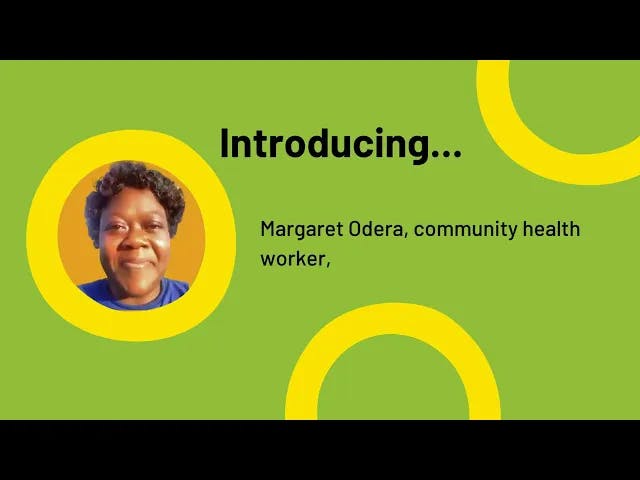First-hand: campaigning for community health worker rights
Margaret Odera as told to Sarah Oughton
22 April 2024
Margaret Odera is a community health worker from Kenya. She is also a passionate campaigner and set up a network to advocate for the rights of all community health workers
Community health workers are key to securing global health
My work is important because we save lives. We are the people who have first contact with patients before they go to the doctors and we play a critical role in global health security.
I can give an example of a community health worker in Tanzania, who noticed that a family of seven people died within a year. So she called the Tanzanian Ministry of Health and told them that something is wrong. That is how they became aware of a Marburg virus disease outbreak and were able to get it under control.
Similarly in slums such as Madara, where I work, things like cholera can easily spread. So when we detect one person with diarrhoea, we report to the Ministry of Health and it will be controlled.
It is because of community health workers in Kenya that polio infections are at almost zero. We play a critical role in mobilising the community to accept the doctor who brings the vaccine.
Translating between communities and doctors
We know the language of communities – we know the health language of a community, we know the religious language. We can translate between the community and doctors, the World Health Organisation and the Ministry of Health. Because of us, communities understand the importance of the vaccines and they will not hesitate to get vaccinated.
We are also a link between the community and health facilities. There are many mothers who don't want to give birth in a facility because they don't know the importance of healthcare, but because of community health workers many children now are born in hospital and they're being vaccinated in the hospital, so the mortality rates of children have gone down.
Community health workers need a seat at the table
I started the Community Health Workers Champions Network in 2020, after I went to Thailand for the Prince Mahidol Award. I went in my role as a mentor mother, not as a community health worker, and I went to speak about my story.
One of the main topics at the conference was community health workers, but the funny thing was that community health workers were not represented there. And I felt so lonely. I was thinking, we are the topic but why are we not being represented here?
Instead we are being represented by doctors and nurses who receive a salary at the end of every month. But we are unpaid, we don’t receive training, we are ignored and not treated as professionals. And if we’re nowhere to be seen, nothing will be done. I mean, there is no solution without community health workers speaking up about the problems.
So when I went back to Kenya I said, hey, we have a problem. They were talking about primary healthcare, but they are not talking about us and not talking about paying us.
At the end of every month, nurses and doctors go smiling to the bank. But the community health workers, who are 70% women, get nothing. It is so discouraging.
So we started a WhatsApp group and we now have more than 6,800 community health workers. We advocate using social media platforms. We say pay and protect community health workers. When a community health worker is attacked, there is no law that protects them. Nurses and doctors have their own lawyers, they are protected. But community health workers are not protected in any way. We are not even insured. So we have a really big gap.
Community health workers must be paid
We play a critical role, and it’s like we are the basement of the health system, of the health structure. But then there is a big problem because no matter how beautiful a house is, if the basement has cracks, there is a problem.
Through LinkedIn I connected with Doctor Madeline Ballard from Community Health Impact Coalition and she supported us with advocacy training. Right now, 7,000 community health workers have done the advocacy training. And in the process I met other community health workers from 17 countries in Africa.
We have had some success because right now in Kenya, community health workers have started receiving stipends. And we are being trained to use digital platforms. Because we were using pen and paper up until now. This is the first line of professionalisation.
Our stipend is small, it is around $25.00 a month. But it is the beginning. We start from there and I believe that it will develop from a stipend to a salary. Because you need to have salaried community health workers. I believe it will happen.
It is a gender injustice of course, because if it was 70% of men in the sector being unpaid, it wouldn’t have stayed this way for so long. So I encourage leaders, and the World Health Organization to put pressure on countries to professionalise community health work and pay us as we deserve to be paid.
Get our news and blogs by email
Keep up-to-date with all our latest news stories and blogs by signing up to the Be in the KNOW news digest.
